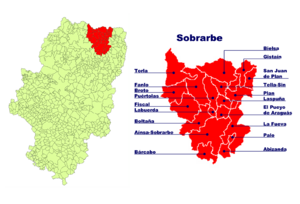Battle of Bielsa pocket facts for kids
Quick facts for kids Battle of Bielsa pocket |
|||||||
|---|---|---|---|---|---|---|---|
| Part of the Spanish Civil War | |||||||
 Location of Bielsa in Aragon. |
|||||||
|
|||||||
| Belligerents | |||||||
| Commanders and leaders | |||||||
| Antonio Beltran | José Solchaga José Iruretagoyena |
||||||
| Strength | |||||||
| 7,000 men 4 artillery guns |
14,000 men 30 artillery guns |
||||||
| Casualties and losses | |||||||
| Unknown but high | Unknown | ||||||
The Battle of Bielsa Pocket was an important event during the Spanish Civil War. It happened from April 14 to June 15, 1938. In this battle, a group of soldiers called the Republicans were surrounded by another group, the Nationalists. This happened in the Cinca River Valley in Spain. Even though they were greatly outnumbered, the Republican soldiers fought bravely. They held their ground for a long time before finally moving into France.
What Led to the Battle?
The Spanish Civil War was a big conflict in Spain from 1936 to 1939. It was fought between two main sides. One side was the Republicans, who supported the elected government. The other side was the Nationalists, led by General Francisco Franco.
In March 1938, the Nationalists launched a major attack. This attack was called the Aragon Offensive. They broke through the Republican lines and pushed them back. By April, the Nationalists had reached the Mediterranean Sea. They took control of a large area called Aragon.
During this advance, one Republican group became trapped. This was the 43rd Division of the Republican Army. They were led by a commander named Antonio Beltran. People nicknamed him El Esquinazado, which means "The Dodger". His division was surrounded in the Cinca River Valley, close to the border with France.
The Fight in the Bielsa Pocket
The 43rd Division, led by "The Dodger," had about 7,000 soldiers. They had only four artillery guns and no air support from planes. On the other side, the Nationalists had a much larger force. They had 14,000 soldiers, 30 artillery guns, and many planes.
The Republican soldiers were almost completely cut off. They didn't have many spare bullets or supplies. Despite being outnumbered, they managed to stop the Nationalist attacks. This was partly because the land was very rough and mountainous. The weather was also bad, which made fighting harder. Most importantly, the Republican soldiers fought with great determination.
By the end of May, it became clear that they couldn't hold out much longer. The Republican troops helped about 4,000 civilians escape to France. Then, the soldiers slowly retreated themselves, crossing into France. On June 6, the town of Bielsa fell to the Nationalists. By the night of June 15–16, all the remaining Republican soldiers had crossed into France.
What Happened After?
This battle might not have changed the overall outcome of the war. However, the brave resistance of "The Dodger's" division was a big boost for the Republicans. After many defeats, their strong fight at Bielsa gave them hope.
After crossing into France, the French government gave the Republican soldiers a choice. They could either return to areas still controlled by the Republicans in Spain. Or, they could go to areas controlled by the Nationalists. Most of the soldiers, over 6,000 of them, chose to return to Republican territory. Only 411 soldiers and five nurses chose to go to Nationalist areas.
See also
 In Spanish: Bolsa de Bielsa para niños
In Spanish: Bolsa de Bielsa para niños
- List of Spanish Republican military equipment of the Spanish Civil War
- List of Spanish Nationalist military equipment of the Spanish Civil War

